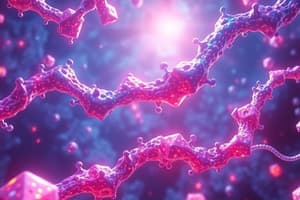Podcast
Questions and Answers
What is the preferred energy source for the brain?
What is the preferred energy source for the brain?
- Glucose (correct)
- Amino acids
- Fatty acids
- Ketones
Which of the following is NOT a primary source of glucose?
Which of the following is NOT a primary source of glucose?
- Dietary intake of disaccharides
- Monosaccharides from fruits
- Glycogen degradation from liver
- Lactate produced during anaerobic glycolysis (correct)
How does insulin affect glucose levels in the body?
How does insulin affect glucose levels in the body?
- It inhibits glucose uptake into cells.
- It increases glucose production in the liver.
- It promotes the storage of glucose in fat tissues.
- It decreases glucose levels by increasing cellular uptake. (correct)
What role does glucagon play in glucose metabolism?
What role does glucagon play in glucose metabolism?
Which cells require glucose as their energy source due to the absence of mitochondria?
Which cells require glucose as their energy source due to the absence of mitochondria?
In what scenario is glycogen rapidly released from the liver?
In what scenario is glycogen rapidly released from the liver?
What is the effect of glucagon on heart muscle cells?
What is the effect of glucagon on heart muscle cells?
What happens to cAMP levels when insulin is released?
What happens to cAMP levels when insulin is released?
Which of the following carbohydrates is considered a glucose precursor?
Which of the following carbohydrates is considered a glucose precursor?
In the absence of gluconeogenic pathways, how long can the body rely on glycogen stores?
In the absence of gluconeogenic pathways, how long can the body rely on glycogen stores?
What is the role of glycogen synthase in glycogenesis?
What is the role of glycogen synthase in glycogenesis?
Which statement correctly describes the 'a' form of glycogen synthase?
Which statement correctly describes the 'a' form of glycogen synthase?
What effect does glucagon have on glycogen metabolism in the liver?
What effect does glucagon have on glycogen metabolism in the liver?
What happens to cAMP levels in response to insulin secretion?
What happens to cAMP levels in response to insulin secretion?
Which enzyme is primarily affected by high concentrations of glucose-6-phosphate?
Which enzyme is primarily affected by high concentrations of glucose-6-phosphate?
Which of the following correctly describes the effect of phosphorylation on glycogen synthase?
Which of the following correctly describes the effect of phosphorylation on glycogen synthase?
How does insulin affect the levels of glycogenolysis and glycogenesis?
How does insulin affect the levels of glycogenolysis and glycogenesis?
What is the primary effect of the inhibition of glycogenesis by the cAMP-directed pathway?
What is the primary effect of the inhibition of glycogenesis by the cAMP-directed pathway?
Which factor primarily activates adenylate cyclase in liver cell membranes?
Which factor primarily activates adenylate cyclase in liver cell membranes?
What is the nature of the 'b' form of glycogen synthase?
What is the nature of the 'b' form of glycogen synthase?
What is the main effect of the calcium-calmudulin complex on liver phosphorylase kinase?
What is the main effect of the calcium-calmudulin complex on liver phosphorylase kinase?
Which hormones are mainly involved in the activation of glycogen degradation in the liver?
Which hormones are mainly involved in the activation of glycogen degradation in the liver?
How does AMP contribute to glycogenolysis in muscle tissue?
How does AMP contribute to glycogenolysis in muscle tissue?
What is the primary purpose of glycogenolysis?
What is the primary purpose of glycogenolysis?
What role does cAMP play in glycogen metabolism?
What role does cAMP play in glycogen metabolism?
Where does glycogenesis primarily occur when blood glucose levels are high?
Where does glycogenesis primarily occur when blood glucose levels are high?
What is the consequence of phosphorylation on glycogen metabolism enzymes?
What is the consequence of phosphorylation on glycogen metabolism enzymes?
Which pathway activates glycogen degradation?
Which pathway activates glycogen degradation?
Which statement about epinephrine's effect on muscle glycogen is correct?
Which statement about epinephrine's effect on muscle glycogen is correct?
What triggers the activation of phosphorylase b in muscle tissue?
What triggers the activation of phosphorylase b in muscle tissue?
Which hormones primarily stimulate glycogenolysis?
Which hormones primarily stimulate glycogenolysis?
Glycogen is composed of glucosyl units linked by which type of bonds?
Glycogen is composed of glucosyl units linked by which type of bonds?
What happens to glycogen metabolism when cAMP levels rise in the liver?
What happens to glycogen metabolism when cAMP levels rise in the liver?
What is the overall effect of hormonal signals on glycogen metabolism?
What is the overall effect of hormonal signals on glycogen metabolism?
What is the role of cAMP in glycogen metabolism?
What is the role of cAMP in glycogen metabolism?
How often do α-1,6-branches occur in glycogen?
How often do α-1,6-branches occur in glycogen?
What is the result of activating glycogen phosphorylase b in muscle?
What is the result of activating glycogen phosphorylase b in muscle?
Which of the following is true regarding the location of glycogenolysis?
Which of the following is true regarding the location of glycogenolysis?
What describes the function of lysosomal degradation of glycogen?
What describes the function of lysosomal degradation of glycogen?
Which of the following compounds is primarily involved in energy storage in animal cells?
Which of the following compounds is primarily involved in energy storage in animal cells?
Which of the following best describes the role of glycogen in metabolism?
Which of the following best describes the role of glycogen in metabolism?
In which organ is glycogen primarily synthesized and stored?
In which organ is glycogen primarily synthesized and stored?
During glycogenolysis, which enzyme is responsible for the breakdown of glycogen?
During glycogenolysis, which enzyme is responsible for the breakdown of glycogen?
Which of the following signals is most influential in stimulating glycogen breakdown?
Which of the following signals is most influential in stimulating glycogen breakdown?
What effect does insulin have on glycogen metabolism?
What effect does insulin have on glycogen metabolism?
Flashcards are hidden until you start studying
Study Notes
Glycogen Metabolism Overview
- Glycogen serves as the primary storage form of glucose, composed of glucosyl units linked by α-1,4-glycosidic bonds, with branches formed by α-1,6 linkages every 8 to 10 units.
- Essential for energy storage derived from carbohydrates; glycogen can be rapidly released from the liver and kidneys in the absence of dietary glucose sources.
- Majorly degraded in exercising muscle to provide energy.
Glycogenolysis (Degradation of Glycogen)
- Involves shortening of glycogen chains and removal of branches, facilitating glucose homeostasis.
- Converts glucose 1-phosphate to glucose 6-phosphate to regulate blood glucose levels.
- Lysosomal degradation of glycogen aids in maintaining energy balance.
Regulation of Glycogen Synthesis and Degradation
- Glycogen degradation is activated by cAMP-directed pathways, especially during low glucose levels.
- Glycogenesis occurs when blood glucose is high, predominantly in the liver and muscles.
- Hormones like glucagon and epinephrine stimulate glycogenolysis, primarily in the liver.
Key Hormones and Their Functions
- Insulin: Lowers cAMP levels, enhancing glucose uptake into cells, and boosts glycogen synthesis.
- Glucagon: Raises cAMP levels, activates glycogenolysis, and is active on heart muscle but not skeletal muscle.
- Epinephrine (Adrenaline): Increases cAMP levels in muscle, promoting glycogenolysis and inhibiting glycogenesis.
Key Enzymes in Glycogen Metabolism
- Glycogen Synthase:
- Exists in active “a” form (dephosphorylated) and inactive “b” form (phosphorylated).
- Insulin promotes the activation of glycogen synthase, enhancing glycogenesis.
- Glycogen Phosphorylase:
- Activated in muscle by AMP, promoting glycogenolysis without phosphorylation.
Coordination of Glycogen Synthesis and Degradation
- Both processes are regulated by hormonal signals such as epinephrine, which enhances glycogenolysis while inhibiting glycogenesis through an increase in cAMP levels.
- Phosphorylation of key enzymes by kinases alters their activity, influencing metabolic pathways.
Primary Sources of Glucose
- Dietary intake: includes starches, monosaccharides (like fructose), and disaccharides (such as lactose, maltose, sucrose).
- Glycogen degradation: occurs rapidly from liver and kidney reserves when dietary glucose is unavailable.
- Gluconeogenesis pathways support glucose levels for about 12 hours in fasting states.
Implications of Glycogen Storage Diseases
- Impairments in glycogen metabolism can lead to storage diseases affecting liver and muscle function, highlighting the importance of proper regulation in maintaining energy homeostasis.
Studying That Suits You
Use AI to generate personalized quizzes and flashcards to suit your learning preferences.


